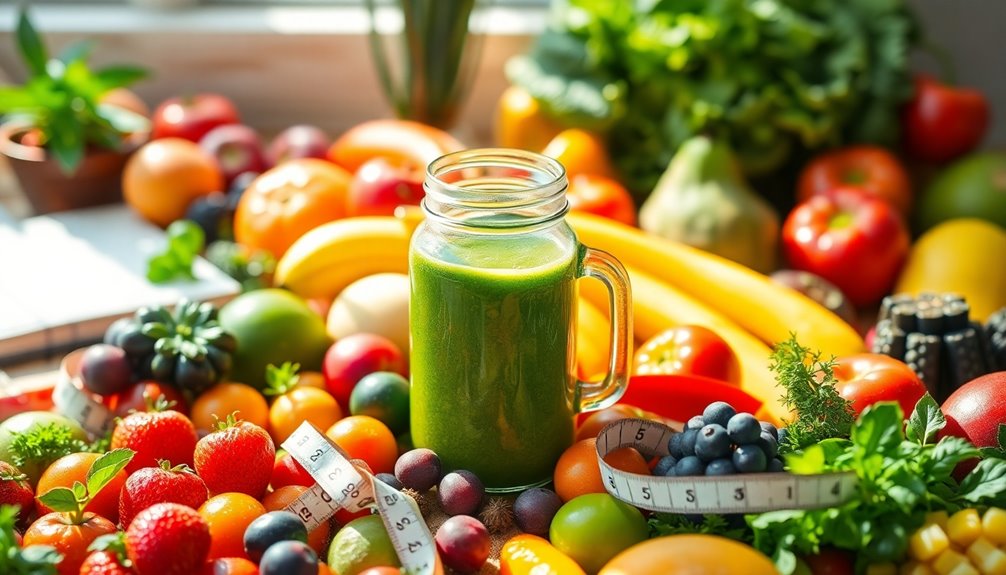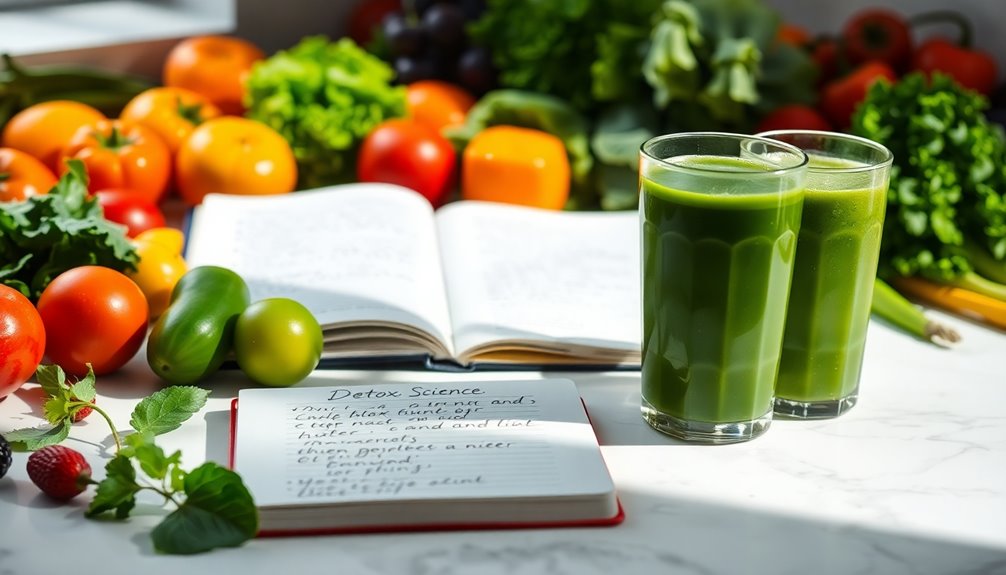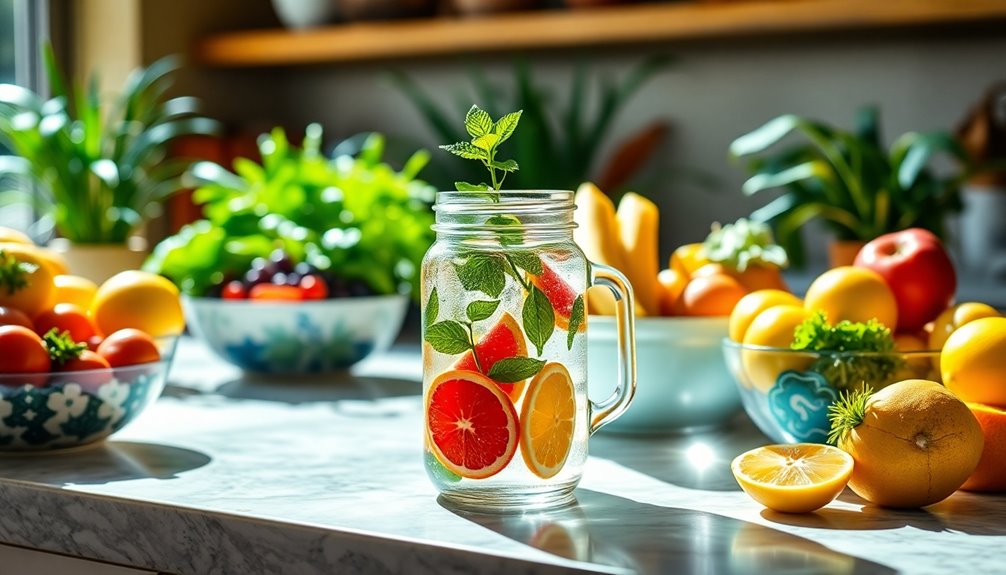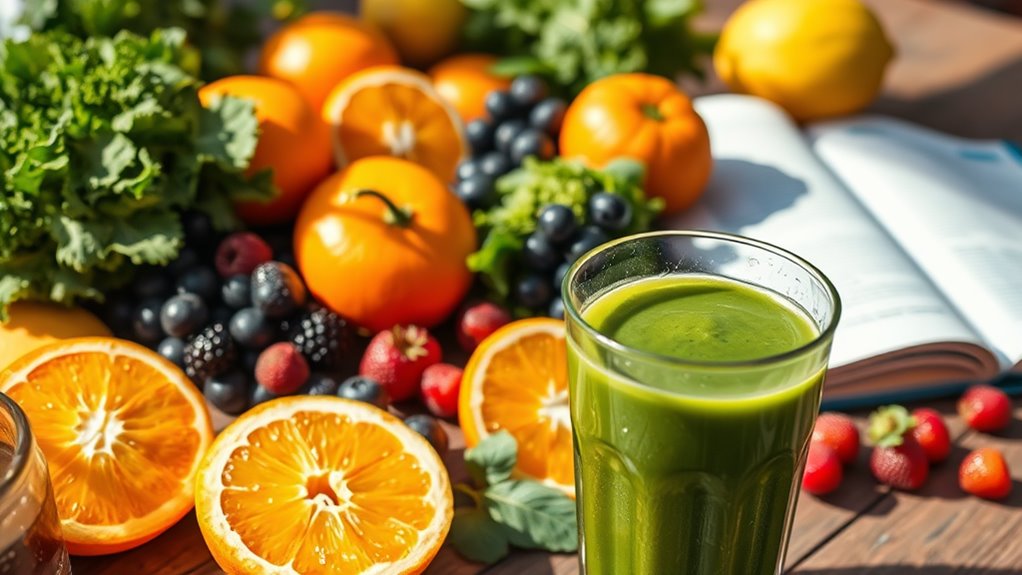Detox diets often promise quick fixes for health and weight loss, but the truth is that your body is equipped with natural detox systems, like the liver and kidneys. These organs eliminate toxins efficiently, making extreme diets largely unnecessary and sometimes harmful. While you might experience short-term benefits, such as weight loss or better energy levels, the risks include nutrient deficiencies and negative side effects like nausea. Experts recommend focusing on a balanced diet and sustainable lifestyle changes instead. If you're curious about safer alternatives and a holistic approach, there's more valuable information just ahead.
Key Takeaways
- Detox diets claim to eliminate toxins, but the body already has effective self-cleaning mechanisms involving the liver, kidneys, and digestive system.
- While detox diets may lead to temporary weight loss, sustainable changes require long-term dietary modifications beyond the detox phase.
- Extreme detox diets can cause nutrient deficiencies and may disrupt metabolism, leading to potential health risks.
- Celebrity endorsements of detox diets often lack scientific backing and can mislead individuals regarding their effectiveness and safety.
- Consulting healthcare professionals and relying on balanced, whole-foods diets is essential for effective and safe health improvements.
What Are Detox Diets?

Detox diets are popular dietary regimens that claim to rid your body of toxins and promote overall health. Many people flock to these diets, hoping for a quick fix to improve their well-being. However, it's crucial to sift through the detox myths surrounding these diets to understand their true effectiveness.
You might've heard various claims, like detox diets can cure diseases or help you lose weight rapidly. While some diets emphasize fruits, vegetables, and hydration, the reality is that your body already has a built-in detoxification system. Your liver, kidneys, and digestive system work tirelessly to eliminate harmful substances. In fact, consuming high-carb foods, such as traditional bread, can exacerbate cravings and hinder your body's natural detox processes due to blood sugar spikes.
So, while a healthy diet can certainly support these functions, there's little evidence that specific detox diets can enhance detox effectiveness beyond what your body already does.
Moreover, many detox diets can be restrictive, which might lead to nutrient deficiencies if followed for extended periods. Instead of detoxing, consider adopting a balanced, whole-foods approach to eating that emphasizes moderation and variety.
This way, you can nourish your body without falling for detox myths.
It's also important to remember that everyone's body is unique. What works for one person mightn't work for another. If you're looking to improve your health, focus on sustainable lifestyle changes rather than quick fixes. Engaging with a supportive community can also help you stay motivated on your wellness journey, allowing you to feel a sense of belonging while making healthier choices.
The Science Behind Detoxing

Understanding the science behind detoxing reveals that the human body is equipped with sophisticated mechanisms for self-cleaning. Your liver, kidneys, and gastrointestinal system all play crucial roles in removing toxins and waste products. These organs continuously filter out harmful substances, ensuring your body operates smoothly without the need for extreme detox diets.
You might've heard various detox myths suggesting that specific diets or cleanses are necessary for prime health. However, the detox evidence shows that most people don't need these drastic measures. Instead, a balanced diet rich in fruits, vegetables, whole grains, and adequate hydration supports your body's natural detoxification processes.
Many detox programs claim to flush out toxins or reset your body, but scientific studies often reveal little to no additional benefits beyond what a healthy lifestyle provides. In fact, some detox methods can lead to nutrient deficiencies or imbalances, undermining your overall well-being. Incorporating effective warm-up routines can enhance your body's natural ability to manage toxins and prevent injuries.
It's crucial to approach detoxing with a critical mind. While you might feel a temporary boost from some detox diets, the long-term benefits often come from consistent, healthy choices rather than quick fixes. Building a supportive community around healthy eating and lifestyle habits can help you feel more empowered in your journey.
Common Types of Detox Diets

Various detox diets have gained popularity, each claiming to cleanse the body and enhance health. You might come across several types, and understanding them can help you navigate this wellness trend.
One common type is the juice cleanse, where you consume only fruit and vegetable juices for a set period, often ranging from a few days to a week. Proponents suggest that this method floods your body with nutrients while allowing your digestive system to rest. However, it should be emphasized that such cleanses might lack essential nutrients and protein.
Another popular option is the use of herbal supplements. These often come in the form of pills, powders, or teas, and are marketed to support liver function or promote detoxification. Ingredients like milk thistle and dandelion root are commonly touted for their purported benefits. While these herbs may have some positive effects, the scientific evidence supporting their detox claims is limited.
Additionally, some detox diets incorporate a combination of whole foods, such as fruits, vegetables, whole grains, and lean proteins, while eliminating processed foods, alcohol, and sugar. This approach can promote healthier eating habits, but it may not necessarily be a "detox" in the traditional sense. In fact, many health experts suggest that a shift to plant-based diets can be one of the most effective ways to improve overall health without the need for extreme detoxification methods.
Before choosing a detox diet, you should consider your health goals, listen to your body, and consult a healthcare professional. It's crucial to approach these diets with a critical eye and a clear understanding of what's involved.
Potential Benefits of Detox Diets

Many people explore detox diets with the hope of experiencing various health benefits. One of the most commonly sought-after outcomes is weight loss. By eliminating processed foods and focusing on whole, nutrient-rich ingredients, you might find it easier to shed excess pounds. Many detox programs encourage a reduction in calorie intake, which can lead to immediate weight loss. However, it's important to recognize that this weight loss may not be sustainable in the long term unless accompanied by lasting dietary changes.
Another potential benefit you may notice during a detox diet is an energy boost. Many detox diets emphasize hydration and the consumption of fruits and vegetables, which are rich in vitamins and minerals. These nutrient-dense foods can fuel your body and improve your overall energy levels. Additionally, by cutting out sugar and other unhealthy foods, you might experience fewer energy crashes throughout the day.
While individual experiences will vary, you may also find that detox diets can help you develop a greater awareness of your eating habits. This newfound mindfulness can lead to healthier choices even after you complete the detox. Moreover, understanding the concept of natural calorie cycles can further enhance the benefits of your dietary changes and promote long-term health.
Risks and Side Effects

While detox diets can promise quick results, they also come with several risks and side effects that you should be aware of. Many people jump into these diets thinking they'll cleanse their bodies and lose weight, but understanding the potential downsides is crucial.
One major concern is the long-term effects these diets can have on your health. Many detox plans are low in calories and essential nutrients, which can lead to deficiencies over time. This isn't just about feeling tired or irritable; inadequate nutrition may compromise your immune system and overall well-being.
Additionally, extreme detox diets can disrupt your metabolism, making it harder to maintain a healthy weight once you return to regular eating habits.
Safety concerns are another critical factor. You might experience side effects such as nausea, headaches, fatigue, or digestive issues during a detox. These symptoms can make you feel worse instead of better. Moreover, some detox diets promote the use of supplements or products that haven't been rigorously tested, raising questions about their safety and efficacy.
Incorporating a program like Adaptive Body Boost, which emphasizes low-carb, anti-inflammatory foods, can provide a more balanced approach to health and weight loss without the severe risks associated with detox diets.
In short, while the allure of a quick cleanse is tempting, the risks and side effects could outweigh the benefits. Approaching detox diets with caution and seeking advice from a healthcare professional before making significant changes to your eating habits is crucial. Prioritizing balanced nutrition and gradual lifestyle changes is often a safer and more sustainable way to achieve your health goals.
Expert Opinions on Detoxing

Some health experts are skeptical about the effectiveness of detox diets, emphasizing that the body already has its own natural detoxification systems in place. They argue that your liver, kidneys, and digestive system work continuously to eliminate toxins without the need for extreme dietary changes. Many professionals believe that instead of detoxing, focusing on a balanced diet rich in whole foods is a more sustainable approach to health.
Celebrity endorsements for detox diets can create a strong appeal, but it's crucial to look beyond the glitz and glamour. Just because a popular figure promotes a detox program doesn't mean it's effective or even safe. Experts caution that personal experiences shared on social media often lack scientific backing, leading to misplaced trust in these diets. This can foster skepticism among those who recognize that individual results can vary widely.
Additionally, some professionals warn that detox diets might lead to nutritional deficiencies or unhealthy eating patterns. They encourage people to contemplate the long-term impact of such diets rather than short-term weight loss. A plant-based diet, rich in antioxidants and fiber, provides a healthier alternative that supports the body's natural detoxification processes.
You might feel tempted to try a detox after hearing positive testimonials, but it's vital to weigh these opinions against a backdrop of evidence-based research.
Ultimately, while detox diets may promise quick results, expert opinions tend to favor a more holistic approach to health—one that embraces balance, moderation, and a healthy lifestyle rather than drastic measures. So, before diving into the latest detox trend, ponder these perspectives to make informed choices for your well-being.
Making Informed Choices

Making informed choices about your health requires critical thinking and a willingness to sift through information. When it comes to detox diets, relying on credible sources and research findings rather than trendy claims is vital. Understanding the nuances of these diets can help you make decisions that align with your health goals.
Here are three key points to keep in mind when evaluating detox diets:
- Consult Reliable Sources: Seek information from registered dietitians or healthcare professionals who base their advice on established dietary guidelines. This will ensure that you're receiving accurate, science-backed information.
- Evaluate Claims Critically: Many detox diets promise quick results or miracle cures. Scrutinize these claims and look for evidence. Research findings often indicate that the body has its own natural detoxification systems, primarily the liver and kidneys.
- Focus on Sustainable Habits: Instead of short-term detox diets, contemplate making long-term lifestyle changes that promote overall well-being. This might involve adopting a balanced diet rich in fruits, vegetables, whole grains, and adequate hydration. Additionally, understanding the role of oxidized cholesterol in heart health can further guide your dietary choices.
Frequently Asked Questions
Can Detox Diets Help With Weight Loss Long-Term?
Detox diets might promise quick results, but their long-term weight loss impact often falls short. While you may experience initial effectiveness, these diets can be difficult to maintain. Sustainable weight loss usually comes from balanced eating and regular exercise rather than short-term detoxes.
It's important to focus on healthy habits you can stick with instead of relying solely on detox diets for lasting results. Remember, consistency is key for achieving your goals.
Are There Specific Foods That Enhance Detoxification?
If you're looking to enhance detoxification, certain foods can help. Incorporate powerful antioxidants like berries, leafy greens, and nuts into your diet. These foods not only support your body's natural detox processes but also boost gut health, which is essential for overall well-being.
How Often Should One Do a Detox Diet?
When considering detox frequency, it's crucial to listen to your body. Experts suggest doing a detox diet once every few months, allowing your system to reset without overwhelming it.
The detox duration can vary, but one to two weeks is often recommended for effective results. Remember, balance is key; you want to support your health and well-being, not feel deprived.
Always consult a healthcare professional before starting any detox plan.
Do Detox Diets Affect Mental Health or Mood?
Detox diets can impact your emotional well-being and cognitive function. Some people report feeling lighter and more energized, which might boost mood. However, restrictive eating can lead to irritability and decreased focus, especially if you're missing crucial nutrients. Monitoring how you feel during a detox is crucial. If you notice negative changes in your mood or mental clarity, reconsider your approach, as a balanced diet usually supports both emotional and cognitive health better.
Can Detox Diets Interfere With Medications or Medical Conditions?
In the domain of health, you shouldn't overlook the potential for drug interactions when considering detox diets. These diets can interfere with medications, leading to unintended health risks. If you're on prescribed medications or have chronic conditions, it's important to consult with a healthcare professional first.
They'll help you navigate possible complications and guarantee your health remains a priority while you explore dietary changes. Remember, informed choices foster a sense of belonging in wellness communities.
Conclusion
In the quest for wellness, detox diets can seem like a tempting oasis in a desert of conflicting health advice. Yet, as you sip that green juice or nibble on kale, remember that your body's natural detox systems are already working diligently. While some benefits might shine like sunlight on water, the risks can hide like shadows beneath the surface. Make informed choices, listen to your body, and embrace balance for true energy.



